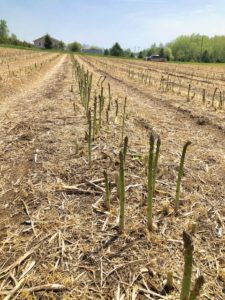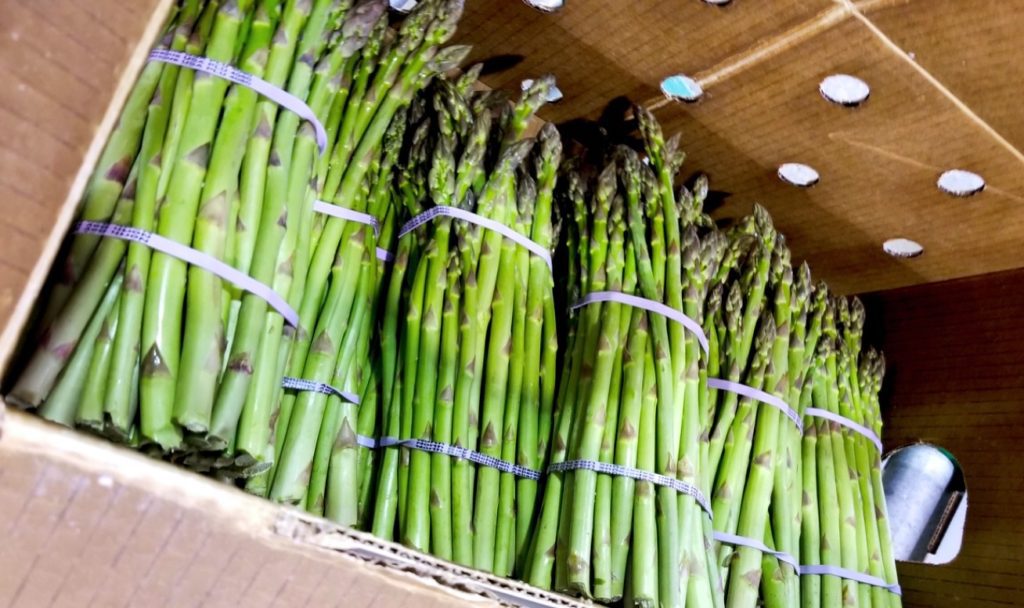Jul 9, 2019Michigan asparagus season winds down
Michigan asparagus growers had a well-deserved chance to relax over the holiday weekend as the busy asparagus season came to a close in the final days of June.
Ideal weather conditions made this year’s 6-7 week season a resounding success for growers, in spite of continued competition from international producers.
Rainy conditions this spring created ideal growing conditions, helping roots soak up plenty of rainwater and produce the juicy spears that Michigan is known for. Cooler temperatures allowed producers to stay on top of harvesting the quickly growing crop.


“When the weather gets hot, the asparagus just shoots up,” said John Bakker, executive director of the Michigan Asparagus Advisory Board. “Under the right conditions, we’ll see up to 10 inches of growth in a single day. Those are the days that require us to go through a field two or three times to harvest. If a grower gets behind, they’ll have to mow the field and lose that part of the harvest – that’s why the mild temperatures we had this season are so important.”
This year’s ideal conditions created steady, predictable growth and superb quality asparagus. Spears harvested throughout the state displayed excellent tip quality, delicious fresh flavor, and desirable thickness.
The 2019 Michigan Asparagus season was a success in terms of volume produced as well as the quality of the crop. USDA is currently reporting that this year’s fresh market production reached an all-time high of 14 million pounds. On the flip side, the market for processed asparagus reached an all-time low this year, at just 7 million pounds.
With ideal weather conditions and superb quality, the major setback for Michigan Asparagus again took the form of imported asparagus flooding the market during Michigan’s growing season. Beginning in late May, imported fresh asparagus from Peru and Mexico began to come into the U.S. undercutting costs associated with domestic production. Michigan shippers reported that a number of retailers canceled standing orders in favor of the low-cost imports. It is well known that growers in Peru and Mexico are able to pay workers much less, cutting down on harvesting costs – however, that’s not the only disparity.
Michigan’s asparagus season relies on the weather, and uses rainwater instead of irrigation for a more sustainable product. Growers in Peru and Mexico can simply turn on their irrigation systems and harvest asparagus any time of the year. While this is great for asparagus lovers during the dead of winter, flooding the market with imported product during Michigan’s limited window of opportunity hurts Michigan family farmers as it decreases demand and puts retailers in the tough position of choosing between a fresh local product and a lower cost import.
This season, the Michigan Asparagus Advisory Board addressed the issue head-on, with nationwide consumer-facing campaigns that emphasized freshness, food miles, sustainability, and supporting local famers. In response, consumers overwhelmingly expressed that when it comes to produce, they prefer to purchase local, U.S.-grown items when they are in season.
The advisory board also mobilized its wide support base with weekly swag giveaways including Michigan-asparagus-themed hoodies, kitchen towels, and shopping bags. As consumers engaged with these giveaways and joined in the social media conversation, many became advocates for Michigan asparagus in addition to remaining aware of its seasonality and how to identify it in the store.
Michigan asparagus’ family farmers are thankful for another successful growing season, and are committed to maintaining their values of seasonally fresh, USA grown, sustainable asparagus.
– The Michigan Asparagus Advisory Board
Photos: Full Tilt Marketing/The Michigan Asparagus Advisory Board















